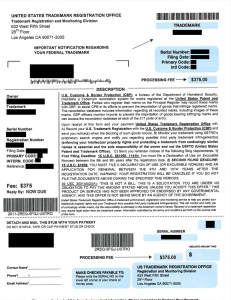People who apply to register trademarks with the United States Patent and Trademark Office tend to receive a variety of mailings from companies purporting to be some sort of official trademark-related entity. These are otherwise known as “scams.”
Don’t fall for these scams, and whatever you do, don’t send these people any money.
If you have filed a trademark application with the USPTO, the only point of communication will be with the United States Patent and Trademark Office. Any other entity is not the real thing. For example, there is no government agency referred to as the “United States Trademark Registration Office.”
When an attorney applies to register a trademark on your behalf, in most cases the attorney will be the direct point of contact with the USPTO. Your attorney will then contact you to discuss the relevant issues. Anything the client receives personally is suspicious at best.
The USPTO has posted an online warning about these scams. The Word Intellectual Property Organization has posted a list of companies purporting to be official trademark/IP entities from various countries.
Here’s an example of what a common trademark scam letter looks like (click to enlarge):

If you have a USPTO application or registration, and you receive some mail that might be suspicious, don’t fall for the scam. Go with your gut, and if there is any doubt at all, ask a qualified trademark attorney. And if you want to help stamp out this practice, consider signing this online petition to encourage the USPTO to investigate and take action against these scams.

